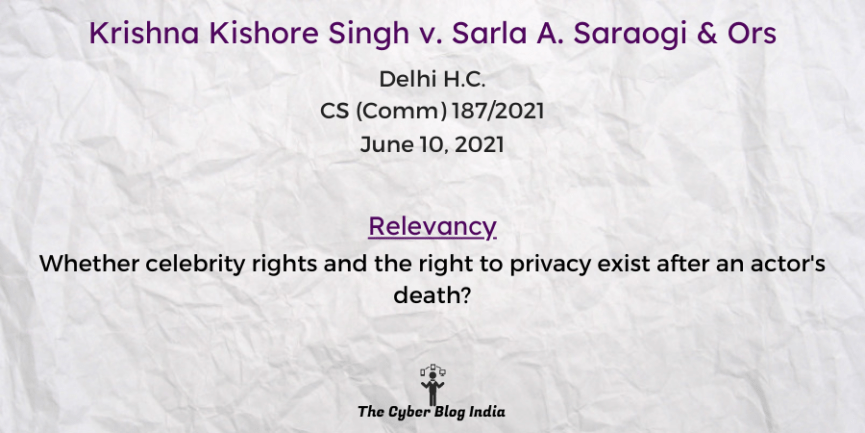Krishna Kishore Singh v. Sarla A. Saraogi & Ors

Krishna Kishore Singh v. Sarla A. Saraogi & Ors
AIR 2021 (NOC 873) 355 : (2021) 88 PTC 40
In the High Court of Delhi
CS (Comm) 187/2021
Before Justice Sanjeev Narula
Decided on June 10, 2021
Relevancy of the Case: Whether celebrity rights and the right to privacy exist after an actor’s death?
Statutes and Provisions Involved
- The Hindu Succession Act, 1956 (Section 16)
- The Public Records Act, 1993 (Section 2(e))
- The Indian Evidence Act, 1872 (Section 74)
- The Indian Succession Act, 1925 (Section 306)
- The Copyright Act, 1957
Relevant Facts of the Case
- A famous Bollywood actor (“SSR”) passed away under mysterious circumstances. His death attracted widespread print, electronic, and social news coverage. The plaintiff, the actor’s father, filed an FIR to investigate the incident.
- The plaintiff believes the defendants are exploiting the frenzy surrounding his son’s death for their commercial gain.
- The defendants were making a movie, which was a self-proclaimed tribute to SSR, without first approaching his family.
- The plaintiff seeks an injunction against the defendants. The grounds are a violation of the rights to publicity, privacy, and free and fair trial.
Prominent Arguments by the Advocates
- The plaintiff’s counsel submitted that celebrity rights offer posthumous protection to a celebrity’s legal heir. Third parties cannot use these rights for commercial gain without the legal heir’s consent. The only exception to the right to privacy is if the information is already available in the public records. In the present case, no such records exist. The defendants’ fictitious portrayal of the death would prejudice the plaintiff’s case. The right to a fair trial trumps the right to free speech.
- The defendant’s counsel denied using SSR’s image in the film. He submitted that certain rights cease to exist after a person’s demise. Further, the right to privacy is not the same for public figures. There is a plethora of material on SSR available in the public domain. Hence, there lies no question of the right to privacy. A party cannot claim copyright in actual facts or historical events. The right to privacy extinguishes on the celebrity’s demise, and so does the right to publicity.
- The defendant’s counsel further submitted that a gag order would violate the freedom of speech and expression. Their film was a fictional rendition and not a biography. The film also carries a disclaimer to this effect. The defendants are not under an obligation to take the plaintiff’s permission. Moreover, investigative agencies and the judiciary do not rely on films for investigation or trial.
Opinion of the Bench
- No one can claim copyright over historical and biographical facts as they are a part of the public domain.
- There is no element to hold that the film would lead the public to believe that the story is true or that the plaintiff endorsed it. Since the defendants’ work is fictional, there is no infringement of celebrity rights.
- The defendants’ right to present fictional stories cannot be curbed based on unsubstantiated hypotheses.
Final Decision
- The bench dismissed the suit.
Anjali Agrawal, an undergraduate student at the NALSAR University of Law, prepared this case summary during her internship with The Cyber Blog India in May/June 2022.
